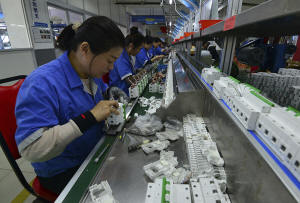China shrugs off threat of US tariffs to economy, says it has tools to
protect jobs
[April 28, 2025] By
ELAINE KURTENBACH
China’s leaders are downplaying the potential impact from U.S. President
Donald Trump’s trade war, saying they have the capacity to protect jobs
and limit damage from higher tariffs on Chinese exports.
The briefing Monday by several senior officials of different government
ministries appeared aimed at shoring up confidence with promises of
support for companies and the unemployed, easier lending conditions and
other policies to counter the impact of combined tariffs of up to 145%
on U.S. imports from China.
It followed a meeting of China's powerful Politburo last week that
analysts said had focused on ways to counter keep growth on track
despite slowing exports.
“Chinese policymakers are on heightened standby mode,” Louise Loo, lead
economist at Oxford Economics said in a a report. She noted that the
policies were similar to earlier pronouncements.
The status of exchanges, if any, between the White House and Chinese
leader Xi Jinping remains unclear.
Trump said last week that he’s actively negotiating with the Chinese
government on tariffs — while U.S. Treasury Secretary Scott Bessent said
talks have yet to start.
Beijing has denied that any such talks were underway, and China has
retaliated against Trump's tariffs by putting 125% import duties on
products from the U.S., among other measures.

The officials who spoke Monday reiterated China's rejection of what
leaders there call bullying.
“They make up bargaining chips out of thin air, bully and go back on
their words, which makes everyone see one thing more and more clearly,
that is the so-called ‘reciprocal tariffs’ severely go against
historical trends and economic laws, impact international trade rules
and order and seriously impair the legitimate rights and interests of
countries,” said Zhao Chenxin, deputy director of the National
Development and Reform Commission, the country’s main economic planning
agency.
The trade war between the world’s two largest economies has the
potential to bring on a recession in the U.S., with repercussions across
the globe. China has been struggling to recharge its own growth after
the job losses and other shocks of the pandemic.
Economists at the International Monetary Fund and some investment houses
have downgraded their estimates for growth in China this year, to about
4%. Millions of export oriented jobs are at stake.

[to top of second column] |

Workers assemble circuit breakers at a manufacturer of electronic
equipment, in Fuyang city in central China's Anhui province on April
15, 2025. (Chinatopix via AP)
 Still, Chinese officials say they
believe the economy has the momentum to expand at the target rate of
about 5% this year, in line with growth in 2024.
Yu Jiadong, a vice minister of Human Resources and Social Security,
told reporters in Beijing that a full and objective analysis shows
China's “employment policy toolbox is sufficient.”
The government will step up support for companies to help them keep
workers and also encourage entrepreneurship among the unemployed, Yu
said.
China also can manage without energy imports from the United States,
said Zhao, the NDRC deputy director.
“Enterprises reducing or even stopping energy imports from the
United States will have no impact on our country’s energy supply,”
he said.
China has been gradually cutting its imports of U.S. grains and
other farm products, and Zhao said that stopping such purchases
would not compromise the food supply. Most grain purchases were for
livestock feed and the international market has adequate stocks to
make up for any reduction in imports of corn, sorghum, soy and oil
from American suppliers, he said.
A deputy governor of the central bank, Zou Lan, said the People's
Bank of China will cut interest rates and relax reserve requirements
as needed to encourage lending.
“Incremental policies will be introduced in a timely manner to help
stabilize employment, enterprises, markets, and expectations,” Zou
said.

China can expand domestic demand through various policies including
rebates for swapping old vehicles, appliances and factory equipment
for new ones, Zhao said, forecasting that demand for equipment
upgrades will exceed 5 trillion yuan ($34.8 billion) a year.
In the longer term, China also is promoting the shift of more people
to cities from the countryside, Zhao said.
“Every 1 percentage point increase in the urbanization rate can
stimulate trillions of investment demand,” he said. “Our country has
very real potential and space to expand domestic demand.”
___
AP video producer Borg Wong contributed.
All contents © copyright 2025 Associated Press. All rights reserved |